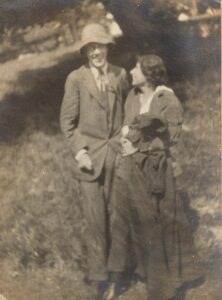
Spouse Adrian Stephen & Karin Stephen
Karin Costelloe-Stephen
* March 10, 1889
† December 12, 1953
Though Catherine Elizabeth (‘Karin’) Stephen née Pearsall Conn Costelloe is better known for her significant later contributions to the history of psychoanalysis, her academic career began in philosophy. She was the first woman to be awarded a ‘Star’ or Distinction in the Moral Science Tripos in 1911, after which she joined the Aristotelian Society in 1912. From then onwards, she developed her philosophical views in a series of papers, culminating in her 1922 book The Misuse of Mind. Although she presents her work primarily as defending a Bergsonian outlook against Russell’s attacks, she developed a series of original views of e.g. mereology, change, abstraction, knowledge by acquaintance, and language. She was part of the Bloomsbury group, and her account of knowledge by acquaintance may have influenced the conception of the stream of consciousness developed by Virginia Woolf (see Vrahimis 2022, 36), while her distinction between complexity and synthesis had an influence on Roger Fry’s analyses of impressionist art (see de Mille 2024). She abandoned philosophy during the 1920s, turning to psychoanalysis together with her husband Adrian Stephen (Woolf’s and Vanessa Bell’s brother). She lectured on psychoanalysis in Cambridge during the 1930s, and wrote numerous works on the topic, which she also connected to her political activism against authoritarianism (see Sayers & Tyson 2024).
Dr. Andreas Vrahimis
-
Primary Sources
Costelloe, Karin. 1912–1913. What Bergson Means by “Interpenetration”. Proceedings of the Aristotelian Society 13 (1): 131–155.
Costelloe, Karin. 1913. Review of a New Philosophy: Henri Bergson, by Edouard Le Roy, Vincent Brown. International Journal of Ethics 24 (1): 102–104.
Costelloe, Karin. (Mrs. Adrian Stephen). 1914–1915. Complexity and Synthesis: A Comparison of the Data and Philosophical Methods of Mr. Russell and M. Bergson. Proceedings of the Aristotelian Society 15(1): 271–303.
Costelloe, Karin. 1914. An Answer to Mr. Bertrand Russell’s Article on the Philosophy of Bergson. The Monist 24 (1): 145–155.
Costelloe, Karin. 1914. Review of The Crowning Phase of the Critical Philosophy, by R. A. C. Macmillan. International Journal of Ethics 24 (2): 234–236.
Costelloe, Karin. 1914. Review of the Philosophy of Kant, by A. D. Lindsay. International Journal of Ethics 24 (4): 475–476.
Stephen, Karin. 1917–1918. Thought and Intuition. Proceedings of the Aristotelian Society 18: 38–74.
Stephen, Karin. 1922. The Misuse of Mind: A Study of Bergson’s Attack on Intellectualism. London: K. Paul, Trench, Trubner.
-
Secondary Sources
Banfield, Ann. 2006. The Phantom Table: Woolf, Fry, Russell and the Epistemology of Modernism. Cambridge: Cambridge University Press.
Dainton, Barry. 2021. Irreducibility, Indivisibility and Interpenetration, in: Sinclair, M. & Wolf Y. (Eds.), The Bergsonian Mind. Oxon: Routledge, 393-416.
de Mille, Charlotte. Bergson in Britain: Philosophy and Modernist Painting, c. 1890-1914, Edinburgh: Edinburgh University Press, 2023.
Forrester, John & Cameron, Laura 2017. Freud in Cambridge. Cambridge: Cambridge
University Press.Moravec, Matyáš 2022. Taking time seriously: the Bergsonism of Karin Costelloe-Stephen, Hilda Oakeley, and May Sinclair, in: British Journal for the History of Philosophy, vol. 31 (2), 331–354.
Myers, William Andrew 1995. Karin Costelloe Stephen: 1889–1953, in: Mary Ellen Waithe (ed): Contemporary Women Philosophers: 1900 – Today. Dordrecht: Kluwer, 349–50.
Sayers, Janet & Tyson, Helen 2024. Karin Stephen: Bloomsbury’s Rebel Psychoanalyst, in: Psychoanalysis and History, vol. 26 (1), 55-77.
Vrahimis, Andreas 2019. Sense data and logical relations: Karin Costelloe-Stephen and Russell’s critique of Bergson, in: British Journal for the History of Philosophy, vol. 28 (4), 819–844.
Vrahimis, Andreas 2022. Bergsonism and the History of Analytic Philosophy. Palgrave Macmillan, Cham.
Vrahimis, Andreas. 2021. Russell reading Bergson, in Sinclair, M. & Wolf, Y. (eds.): The Bergsonian Mind. Oxon: Routledge, 350-366.
Watt, Robert 2020. Bergson on number. British Journal for the History of Philosophy, vol. 29 (1), 106–125.
- Online Sources
- ECC
-
Media
-
Projects
-
Quotes
You cannot copy content of this page








